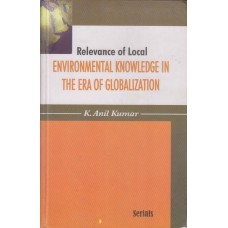Relevance of Local Environmental Knowledge in the Era Globalization |
Author :
K. Anil Kumar
ISBN: 9788183873956
Year: 2011
Pages: 346
Binding: HB
Publisher Name: Serials Publications Pvt. Ltd.
ISBN: 9788183873956
Year: 2011
Pages: 346
Binding: HB
Publisher Name: Serials Publications Pvt. Ltd.
Price:
Price in Dollar: $60
INR 1,195.00
Price in Dollar: $60
Qty:
Indigenous environmental knowledge is an emerging area of study that focuses on the ways of knowing, seeing, and thinking that are passed down orally from generation to generation, and which reflect thousands of years of experimentation and innovation regarding everything from agriculture, animal husbandry and child rearing practices to education; and from medicine to natural resource management. These ways of acquiring knowing are particularly important in the era of globalization, a time in which indigenous knowledge as intellectual property is taking new significance in the search for answers to many of the world's most vexing problems—disease. famine. ethnic conflict, and poverty. Indigenous knowledge has value, not only for the culture in which it develops, but also for scientists and planners seeking solutions to community problems. Development processionals treasure this local knowledge, finding it extremely useful in solving complex problems of health, agriculture, education, and the environment, both in developed and in developing countries. With the rapid environmental, social, economic and political changes occurring in many areas inhabited by indigenous people comes the danger that the Indigenous Knowledge (IK) they possess will be overwhelmed and lost forever. Younger generations are acquiring different values and lifestyles as a result of exposure to global and national influences, and traditional communication networks are breaking down, meaning that Elders are dying without passing their knowledge on-to their children. In some cases, the actual existence of indigenous people themselves is threatened. In this backdrop, the present book makes an attempt to record Konda Reddis' indigenous environmental knowledge and its importance. The main objective of the volume is to document Konda Reddi indigenous knowledge on agriculture, forest plants, and wildlife resource management. This book presents several details regarding indigenous environmental knowledge of Konda Reddi tribe of Andhra Pradesh which is very important for the community for their sustenance. The study concludes by recommending that before such precious knowledge gets lots, it would be wise to protect and promote indigenous knowledge and wisdom widely for self sustenance, and in order to reduce poverty and hunger among indigenous people. This book will be useful for the students of anthropology, tribal and rural research institutes and NGO's to document indigenous knowledge of the various tribal groups in the country and also promote such life sustaining aspects of culture of various tribal communities in India.
Write a review
Your Name:Your Review: Note: HTML is not translated!
Rating: Bad Good
Enter the code in the box below:




